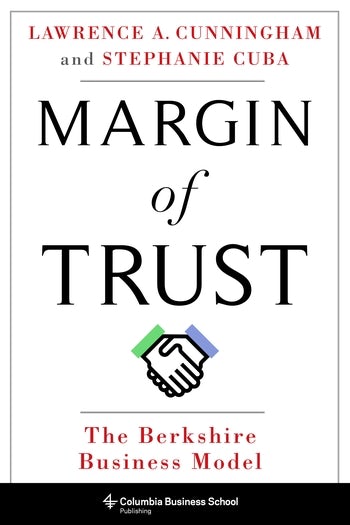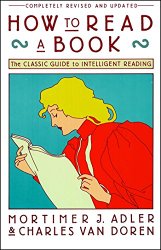In Today’s Issue:
- Margin of Trust: The Berkshire Business Model
- The Narrative Fallacy in Headlines
- Howard Marks on Gambling and Investing
- How to Read a Book
To read last week’s newsletter, please click here.
Margin of Trust: The Berkshire Business Model
Few writers are more familiar with the intricacies of Berkshire Hathaway than Lawrence A. Cunningham whose unique perspective was shaped by a 1996 symposium he organized in which Warren Buffett and Charlie Munger discussed Berkshire’s business and culture at length. Shortly thereafter, Cunningham released his first compilation of Berkshire shareholder letters organized by subject matter rather than by year.
In Margin of Trust, Cunningham and co-author Stephanie Cuba take an in-depth look at the unique management philosophy that has made Berkshire so successful over the years and continues to allow an enormous conglomerate to operate without the type of command-and-control bureaucracies that exist at almost all large firms, and especially at large conglomerates. By demystifying how Berkshire ticks, Cunningham and Cuba uncover generic concepts that could help other organizations improve their culture.
The full review of Margin of Trust, published earlier this week, goes into more detail regarding the topics covered in the book. This article has been viewed more than any Rational Walk article in several years.
The Narrative Fallacy in Headlines
In the sarcastic and sometimes cynical financial subculture of Twitter (known as “fintwit”), the tendency of headline writers to attribute moves in the stock market to “progress on China trade talks” has become something of a recurring joke. Did the stock market fall yesterday? “Stocks Drop Due On Trade Talk Concerns” scream the headlines this morning! Did stocks rally and hit a record high? “Stocks Rally to New Record on Relief Over Phase One China Trade Talk Progress”! More recently, movement in the stock, bond, and commodity markets have been attributed primarily to fears regarding the prospect of war in the Middle East.

The reality, of course, is that markets for stocks, bonds, commodities, cryptocurrencies, and indeed anything that can be traded, move for all kinds of reasons on any given day, many of which are either totally random or for reasons that are unknown, but newspaper articles lack saliency without providing some sort of narrative for people who are struggling to come up with answers. “Stocks Rise in Light Trading for No Particular Reason” is not a headline you will ever read in the Wall Street Journal.
The narrative fallacy, which is explained well in this Farnam Street article, involves the risk of attributing cause and effect to events that might merely be happening at the same time but are not necessarily related in terms of causation. The fact that most human beings are curious and always seek to understand why things are taking place has driven scientific advances and general human progress for thousands of years, but we must avoid fooling ourselves with specious narratives that have no proven basis. Much of what occurs, especially in financial markets, cannot be neatly explained by pointing to one or two events that are taking place concurrently.
Being inundated with information on a daily basis does not usually translate into wisdom, yet most people seek to become more wise by adding more and more information to what they already know, or think they know. Much of this information is actually just noise.
A few years ago, I decided to take a “think week” in the manner inspired by Bill Gates who used this approach while he was building Microsoft. After that week, I wrote an article, Via Negativa: Wisdom Through Subtraction, describing what I did during the week. Part of my approach was to dramatically reduce my consumption of news. Limiting news intake to 15-30 minutes per day allowed me to focus on reading works of more enduring value without the mental pollution and narrative fallacies that are otherwise part of our day-to-day lives by default.
We cannot totally avoid the news because being informed about the world is important as businesspeople, investors, and more importantly, as citizens. But it is up to us to strike the right personal balance and to differentiate between nonsense and actual useful information.
Howard Marks on Gambling and Investing

I had an opportunity to see Howard Marks make a keynote presentation nine years ago, shortly before the publication of his book, The Most Important Thing. One of the themes of his talk involved the importance of emphasizing “second level thinking” when it comes to making investment decisions.
A first-level thinker may see a successful company that makes products he likes and decide to buy the stock. The problem is that other market participants also see the company’s success and the price of the stock could fully discount expectations of future success. The missing question, representing second-level thinking, is to ask whether the price of the stock is too high or too low relative to the investor’s assessment of the company’s future. Any successful investor needs to be able to think about the world in a probabilistic manner and acknowledge that many different future scenarios can unfold.
One must also think about the outcome of decisions beyond the surface level of whether the decision resulted in a good outcome or not. It is not uncommon for a good decision making process to result in a bad outcome, or for a bad process to result in a good outcome from time to time. Over time, however, an intelligent approach to probabilistic decision making is likely to result in better long term outcomes than operating on gut instincts alone.
In his latest memo, entitled “You Bet”, Marks discusses his background in gambling and the parallels between decision making in gambling and investing. These parallels have been noted by many investors in recent years, particularly since the publication of Ed Thorp’s book, A Man For All Markets. Marks mentions Thorp’s experience in gambling and how he translated that into success in the investing world.
Investors may also be interested in Mastering the Market Cycle which Marks published in 2018. Marks does not advocate “market timing”, per se, but rather having the situational awareness to notice what part of a market cycle one is likely to be operating in. His comparison of the cycle of investor psychology to the swing of a pendulum is a particularly apt analogy.
How to Read a Book
It might seems ridiculous to read a book about … reading books. You’ve probably been reading books since grade school. However, when I read (and reviewed) Mortimer Adler’s classic, How to Read a Book, a few years ago, it did change how I approached the reading process. Adler’s approach to inspectional reading is particularly helpful for deciding what to actually read in full and his guidelines for analytical reading help direct your focus when taking a deeper dive. In the video below, William F. Buckley interviews Mortimer J. Adler on Firing Line in 1970.
Was this newsletter forwarded to you by a friend or colleague? Sign up here to receive Rational Reflections directly every week.
Copyright and Disclosures
Nothing in this newsletter constitutes investment advice and all content is subject to the copyright and disclaimer policy of The Rational Walk LLC.
Individuals associated with The Rational Walk LLC own shares of Berkshire Hathaway.
Howard Marks is Chairman of Oaktree Capital Management which is 63% owned by Brookfield Asset Management. Individuals associated with The Rational Walk LLC own shares of Brookfield Asset Management.


